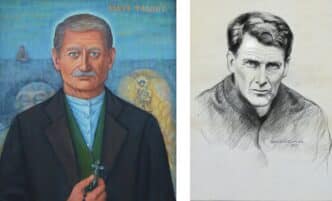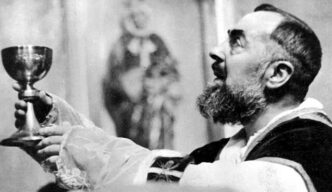This article first appeared in Our Sunday Visitor magazine. Subscribe to receive the monthly magazine here.
Ireland isn’t a particularly dangerous place to visit these days. The country’s name evokes images of sheep, thick cabled sweaters and hearty beer. Not so for a fifth-century missionary named Patrick. As many know, Patrick’s first trip to Ireland was thanks to Irish pirates who brought him there as a slave. He made his way back to his native Britain, was ordained and then answered the Lord’s call to return to Ireland to evangelize its people.
Circumstances are likely not quite so dire in our cases, but we all have our “Irelands” — situations that are challenging to navigate, but into which the Lord is calling us to serve him. To our culture, reentering spaces where we’ve been hurt or rejected looks like a bad idea. We ought to protect ourselves and make sure we’re taken care of. There’s no reason to engage with someone who sees things differently than we do.
Called to evangelize
The Gospel teaches otherwise. Jesus Christ is the Way, the Truth and the Life, and we who have been entrusted with faith in him are responsible to share that reality with everyone we encounter, no exceptions. Even with those who don’t seem to want to listen. Even with those in dark places. Even with those who have pushed us aside, mocked us and ignored us in the past.
Often, perseverance through that kind of treatment is what causes another soul to take notice. The courage and grace it requires to speak about and live the love of Christ, to reflect it in our words and actions, can change hearts. It did in the fifth century and it still does today.
While we are called to reflect Christ, we are also called to reflect on what God is calling us to do in each of our relationships. Sometimes we need to set boundaries, to shake the dust from our feet and turn elsewhere (cf Mt 10:14). This sort of discernment ought to be made through active prayer, with sacrifice, recourse to the sacraments and spiritual direction.
Invoking the Trinity
St. Patrick didn’t convert a country on his own; he led the people to the truth of the living God in the Blessed Trinity. Through a personal relationship with the Lord, he was attuned to the Father’s call and granted the gifts he needed to respond to it. We can do the same, calling to mind a troubled relationship as we offer the prayer of St. Patrick’s breastplate, which begins, “I arise today through a mighty strength, the invocation of the Trinity, through belief in the Threeness, through confession of the Oneness of the Creator of creation.”
With Christ as our guide — with us, before us, behind us, in us, beneath us, above us, on our right, and on our left — we can walk into seemingly dangerous places with trust that his grace will see us through.








